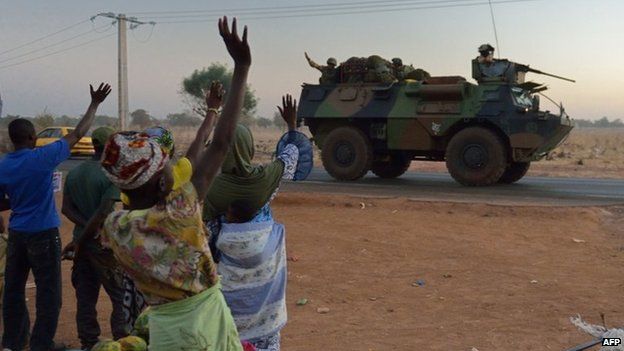Mali: French troops head north into unknown
- Published

A large armoured convoy of French troops left the Malian capital, Bamako, overnight heading for the north in what may signal an intensification of a ground war against Islamist rebels.
Their big guns were ready and their headlights blazing.
At some points along the road people gathered to wave at the French soldiers.
In another development, an official of the ethnic National Movement for the Liberation of Azawad (MNLA) has told the BBC they will fight the Islamist groups.
The MNLA are not Islamists. They were in a loose alliance with the Islamist Ansar Dine and other groups last year when they defeated the Malian army in the north.
But the Tuareg agenda is essentially for self-determination - rather than the strict application of Sharia, which is the aim of Ansar Dine.
French officials have conceded that at least two concentrations of armed Islamist rebels are still a concern for them.
Military secret
One is in the town of Diabaly, about 400km (250 miles) north-east of the capital.
Islamists moved into Diabaly after the French air campaign against them began in other locations, forcing a demoralised Malian government army unit to withdraw.
Another area of concern for the French is the village of Konna, some 550km from Bamako.
Konna is symbolically important because it was the first place to fall to the Islamists in the middle of last week, shortly before the first French air attacks began.
A fascinating account of how Konna was taken has emerged in The Hindu newspaper of India.
The detailed account explained how the Islamists hijacked a public bus which was waved through a security checkpoint.
At the next checkpoint, inside the town, Islamists burst out of the doors of the bus and attacked.
The French Defence Minister Jean-Yves Le Drian said on Tuesday that Konna was not currently controlled by the Malian army.
The final destination of the armoured convoy which left on Tuesday evening is, of course, a military secret.
Finishing power
Large areas of northern Mali are effectively closed off to journalists.
It seems likely that the French are worried about having reporters in the area in case they either find out something potentially embarrassing - or get caught accidentally in an air raid.
"The situation is too dynamic for the French to allow reporters up there," said a security source familiar with similar campaigns.
Until now, the main French effort against the rebels has been aerial bombardment of their positions using jet fighter planes and helicopters.
But this tactic lacks finishing power.
Unless the areas bombed are subsequently occupied on the ground, the opponents of the French and the Malian government who are not killed could regroup.
When France started its attacks against the Islamists in northern Mali the talk was of several hundred French soldiers taking part.
The total due here has now risen to 2,500.
And the French are gathering international military assistance from wherever they can.
Nigeria is due to send some troops soon. Britain has helped with airlift. Belgium has lent helicopters.
Northern Mali is a very big place.
France needs all the help it can get.